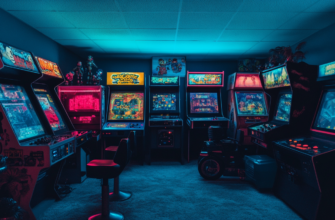- How video games affect your emotional state: a gamer’s guide to maintaining balance
- Understanding the emotional impact of video games
- Why games affect your emotions
- Step-by-step guide to managing emotions while gaming
- Step 1: Recognize when frustration is setting in
- Step 2: Take consistent breaks and cool-off periods
- Step 3: Play games that match your current mood
- Step 4: Communicate with in-game teammates (and mute toxic players)
- Step 5: Set realistic goals
- Step 6: Reflect on how games make you feel
- Practical tips to improve emotional balance while gaming
- Conclusion: Gaming is fun—stay balanced
How video games affect your emotional state: a gamer’s guide to maintaining balance
Hey there, fellow gamer! Let me ask you something: have you ever logged off from a gaming session feeling hyped, frustrated, or even a little down? We’ve all been there. Video games, for many of us, are a core part of our day-to-day lives, offering escapism, excitement, and even community. But what about the emotional side? How does gaming affect your mood and emotions in the long run? And most importantly, how can you manage those emotions to keep loving the games you play while staying mentally balanced?
In today’s guide, we’ll dive into how video games can influence your emotional state—both positively and negatively—and what you can do to make sure your gaming life is enhancing your well-being, not taking away from it. I’ve hit countless game over screens in my day, and after some serious reflection and research, I’ve come up with a few tips that’ll help you better understand and control your emotions while gaming.
Understanding the emotional impact of video games
First, let’s talk about emotions in gaming. Games are unique because they’re interactive. While movies or books might make you feel something passively, in video games, you’re an active participant. This can increase the emotional rollercoaster. Games can elicit joy, competitiveness, anger, and even sadness. Why does this matter? Because when you’re emotionally engaged, it can affect your mental state—even long after you’ve logged out.
Why games affect your emotions
Before we get into tips, it’s important to understand why video games can have such a strong impact on your emotions. Here are a couple of key factors:
- Immersion: Many modern games are designed to pull you deep into their stories or mechanics. Open-world RPGs like “The Witcher 3” or competitive games like “League of Legends” draw you in with rich narratives or high-stakes matches. You’re no longer just playing a game—you *are* the Witcher or the Champion fighting for glory.
- Stakes: The stakes in games can be significant. Whether it’s climbing the ranks in competitive multiplayer or grinding for hours to beat that final boss, the sense of reward or loss is real. When we lose—or when things go wrong—it can hit hard emotionally.
Now that we’ve covered why games affect your emotional state, let’s jump into the juicy part: how you can manage these emotions and make sure you stay on top of your mental game.
Step-by-step guide to managing emotions while gaming
Step 1: Recognize when frustration is setting in
If you’ve ever found yourself snapping at the screen or gripping your controller a bit too tightly, you’re not alone. Gaming frustration is a thing. Whether it’s dying for the 15th time in “Dark Souls” or getting absolutely destroyed in a PvP match, the irritation builds up.
The trick is recognizing when that frustration is creeping into your mind. Take notice of how your body reacts: your heart rate might speed up, your focus narrows, and suddenly that game you love? You’re hating every second of it.
When you catch yourself getting frustrated, it’s time to employ some strategies to step back and cool down.
Step 2: Take consistent breaks and cool-off periods
I cannot stress enough how important it is to take breaks during gaming sessions. When frustration builds up or when you start losing focus, instead of pressing on until you “finally win,” step away. Go grab a snack, walk around, or just rest your eyes. It’s not just about cooling off, either—it actually helps you perform better. A fresh perspective can turn a frustrating session into a victorious comeback.
Try the 60-10 rule: For every hour of gameplay, take a 10-minute break. It seems simple, but trust me—your future self will thank you.
Step 3: Play games that match your current mood
The type of game you play can have a big role in affecting your emotional state. If you’re having a bad day, jumping into an intense, competitive game like “Overwatch” or “Apex Legends” might not be the best idea. Instead, consider playing something with a more casual or light-hearted vibe. A relaxing adventure game or single-player RPG like “Stardew Valley” or “Animal Crossing” can help unwind after a tough day.
On the other hand, if you’re feeling energetic, a fast-paced shooter or MOBA might be exactly what you need to channel that energy.
Step 4: Communicate with in-game teammates (and mute toxic players)
Communication is key when playing with others, but toxic communication? It’s a whole different story. Chances are, if you spend time in online gaming communities, you’re familiar with overly aggressive or downright toxic players. If someone’s bringing you down or spewing negativity, mute them. Seriously, it’s not worth losing your temper over someone you don’t even know.
Instead, focus on communicating effectively with teammates who actually add to the fun. Use voice chat or quick messaging to build synergy. Keeping up positive team vibes will lift your mood too, making the overall experience way more enjoyable.
Step 5: Set realistic goals
Look, I get it. We all want to climb the ranks in games like “Valorant” or “Rocket League,” but setting overly ambitious goals in gaming can often lead to frustration. Instead of aiming for the top rank all at once, set smaller, realistic goals for each session. This way, every improvement feels like progress, and any losses can be chalked up as part of the learning experience.
Think like this: Every death in “Sekiro” is a lesson learned, not just a failure. By shifting your mindset to growth rather than perfection, you’ll walk away from the game feeling satisfied even after tough matches.
Step 6: Reflect on how games make you feel
After a gaming session, take 5 minutes to reflect on how the game made you feel. Were you relaxed? Pumped up? Feeling a bit down? A little reflection goes a long way. If you notice a trend (e.g., “Every time I play ranked, I get super stressed”), it might be time to rethink what you’re playing or how you’re approaching it.
This kind of self-awareness will help you make better decisions for yourself—and maybe even lead you to new games or genres that better fit your emotional state.
Practical tips to improve emotional balance while gaming
Let’s wrap this up with some practical tips I’ve learned to keep my emotional state balanced while gaming. These aren’t hard rules—they’re just things that have worked for me over the years.
- Limit playtime: It’s easy to get sucked into “just one more round,” but too much of any good thing can lead to burnout. Set a time limit for each session so that you keep playing games for fun, not out of habit.
- Consider the social aspect: If you enjoy multiplayer games, play with friends! Having a good laugh or two can make a major difference in maintaining positive energy, even if you lose.
- Variety is good: Don’t stick to just one type of game. Jump between genres. When I mix a story-based single-player game with a few intense multiplayer matches, I give myself more variety to enjoy, which improves my emotional experience.
- Optimize your setup: Not just mentally, but physically. Make sure your gaming environment is comfortable—get a good chair, use proper lighting, and silence unnecessary distractions.
- Replace frustration with gratitude: When I realize I’m getting mad at a game, I take a step back and remind myself of how cool it is that I get to experience these awesome digital adventures. It sounds cheesy, but trust me—it helps.
Conclusion: Gaming is fun—stay balanced
Let’s be real: Video games are fun, addictive, and a huge part of our lives, but they can also take a toll on our emotional state if we’re not careful. By understanding what games can do to our moods, taking consistent breaks, reflecting on our emotions post-session, and setting realistic goals, we can better enjoy our playtime and avoid the negative downsides.
Remember: Gaming is supposed to be fun. If it’s not fun anymore, take a break. There’s no rush to “win” at everything—it’s better to play smart, both in-game and with your emotions. So next time you fire up your favorite game, keep these tips in mind and, most importantly, enjoy yourself while staying balanced.
If you have any personal tips or tricks for managing emotions while gaming, drop them in the comments! I’d love to hear what works for you.

















